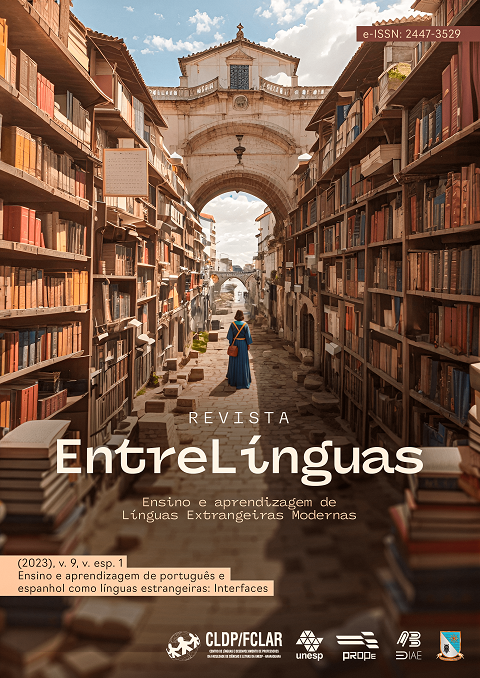Latinity from the reading of literary texts
Finding and possibilities for teaching the spanish language
DOI:
https://doi.org/10.29051/el.v9iesp.1.18409Keywords:
Latinity, Reading, Literary text, Spanish languageAbstract
The sense of Latinity Latin America and the Latin term itself gain different understandings in Brazil if we take into account common sense. What has concerned us and motivated us to deal with this issue is to think about what happens with literature, with teaching, and, in addition, the concept of "being Latino" in the spaces dedicated to Spanish language classes. In this article, we present a study carried out from didactic books of the Spanish language recommended to secondary education, specifically in the reading sections that make use of the literary text, to verify the space of Latinity, from the selection of texts to the development of reading practice. Beyond that, we present suggestions to discuss Latinidad from reading these texts. This discussion contributes to the socio-cultural formation of Spanish language students.
Downloads
References
ARDAO, A. Génesis de la idea y el nombre de América Latina. Caracas: Centro de Estudios Latinoamericanos Romulo Gallegos, 1980.
BRANDALISE, C. O conceito de América Latina: hispano-americanos e a panlatinidade europeia. Cuadernos del CILHA, v. 14, n. 18, 2013. Disponível em: https://lume.ufrgs.br/bitstream/handle/10183/95149/000917575.pdf?sequence=1&isAllowed=y. Acesso em: 18 ago. 2023.
CANCLINI, G. Culturas híbridas: estratégias para entrar e sair da modernidade. Tradução: Heloísa Pezza Cintrão, Ana Regina Lessa. 4. ed. 4. reimpr. São Paulo: Edusp, 2008.
COIMBRA, L; CHAVES, L. S. Cercanía Joven. 2. ed. São Paulo: SM, 2016.
COSSON, R. Letramento Literário: teoria e prática. São Paulo: Contexto, 2009.
FREITAS, L. M. A.; COSTA, E. G. Sentidos en lengua española. 1. ed. São Paulo: Richmond, 2016.
IANNI, O. O labirinto latino-americano. Petrópolis, RJ: Vozes, 1993.
MIGNOLO, V. D. La ideia de América Latina. Barcelona: Editorial Gedisa, 2005.
PINHEIRO-CORREA, P. et al. Confluencia. 1. ed. 2016. São Paulo: Editora Moderna. 2016.
QUIJADA, M. Sobre el origen y difusión del nombre América Latina. Revista de Indias, 1998. Disponível em: http://digital.csic.es/handle/10261/9354. Acesso em: 18 ago. 2023.
QUIJANO, A. Colonialidad del poder y clasificación social. Journal of World-System Research. v. 11, n. 2, p. 342-386, 2000. Disponível em: http://www.ram-wan.net/restrepo/poscolonial/9.2.colonialidad%20del%20poder%20y%20clasificacion%20social-quijano.pdf. Acesso em: 30 jun. 2023.
TENORIO, P.; REYZÁBAL, M. V. El aprendizaje significativo de la literatura. Madrid: La Muralla, S. A., 1992.
TODOROV, T. A literatura em perigo. 3. ed. Rio de Janeiro: DIFEL, 2010.
VARGAS LLOSA, M. A verdade das mentiras. São Paulo: Arx, 2004.
VARGAS LLOSA, M. Dicionário amoroso da América Latina. Tradução: Wladir Dupont e Hortencia Lencastre. Rio de Janeiro: Ediouro, 2006.
Published
How to Cite
Issue
Section
License

This work is licensed under a Creative Commons Attribution-NonCommercial-ShareAlike 4.0 International License.
Os manuscritos aceitos e publicados são de propriedade da Revista EntreLínguas. Os artigos publicados e as referências citadas na Revista EntreLínguas são de inteira responsabilidade de seus autores.
Transferência de direitos autorais – autorização para publicação
Caso o artigo submetido seja aprovado para publicação, já fica acordado que o(s) autor(es) autoriza(m) a UNESP a reproduzi-lo e publicá-lo na EntreLínguas, entendendo-se os termos “reprodução” e “publicação” conforme definição respectivamente dos incisos VI e I do artigo 5° da Lei 9610/98. O artigo poderá ser acessado pela rede mundial de computadores (Internet), sendo permitidas, a título gratuito, a consulta e a reprodução de exemplar do artigo para uso próprio de quem a consulta, desde que haja a citação ao texto consultado. Essa autorização de publicação 328 EntreLínguas, Araraquara, v. 1, n .2, p. 323-328, jul./dez. 2015 não tem limitação de tempo, ficando a UNESP responsável pela manutenção da identificação do(s) autor(es) do artigo. Os artigos publicados e as referências citadas na Revista EntreLínguas são de inteira responsabilidade de seus autores.











